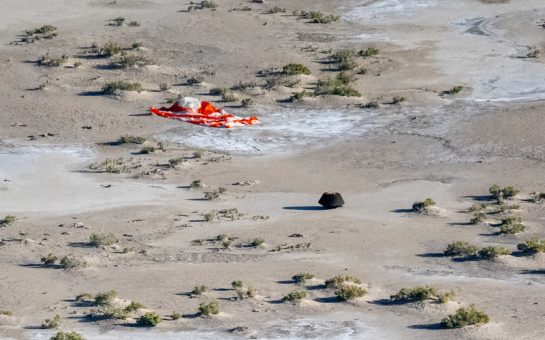A voice counts down from ten. Fire blasts out of a soaring spaceship. A giant spacesuit lumbers across cratered ground.
These are images that have ingrained themselves in the public imagination since 50 years ago when man first walked on the moon. At the time, millions of people held their breath watching grainy television footage of those historic first steps.
But now, the quest to put a man on the moon has been stunningly recreated in director Todd Douglas Miller’s new documentary Apollo 11. Critics have praised its incredible restored visuals and its feat of recreating such a well-known moment in a thrilling, suspenseful way.
“I wanted it to be a fun, entertaining ride and take people on an adventure in a way that they haven’t before,” Todd told MM.
The filmmaking process involved painstakingly combing through thousands of hours of archival footage and audio recordings, much of which had never been released before, to show the awe-inspiring event in an entirely new light.
“We started gathering all the material, so all the film, all the audio that we could get our hands on, and then talking to people who lived through it – the families and flight controllers at mission control,” said Todd.
“Then we could really start weaving together all those little unknown stories and make the big sequences like the launch as entertaining as we could.”
The documentary is constructed purely of this archival footage, with no voiceovers, reconstructions, or interviews.
“Our overarching goal of the project was just to be as accurate as we could.
“It’s the first time that humans stepped foot on another world so by that virtue alone it’s going to be exciting. We didn’t have to ramp it up, the drama’s all there.
“My favourite films are the ones that you don’t necessarily see the fingerprints of the filmmaker – they just get out of the way and let it happen for itself,” he added.
The film is Todd’s second space project, following a short film that portrayed the Apollo 13 mission.
“We really experimented with the structure and the narrative form. It was a little risky to see if we could extend that to a feature length film, but once we got into the materials we found there was clearly enough there, if not more.”
In fact, the massive amounts of footage meant there were some tough decisions about what to leave in the film and what had to be taken out.
NEAR DISASTER
Todd described one such scene that describes a gripping near-disaster.
“They come back in after their moonwalk, and Buzz turns in the lunar module and knocks off a circuit breaker.
“It was the circuit breaker for the engine, so they didn’t know if the engine would light or not. They would have been marooned on the moon.”
Thanks to a clever use of a ballpoint pen, the astronauts were saved.
Another scene which unfortunately hit the cutting room floor involves a 25-year-old mathematician named Poppy Northcut. “It was really unique to hear a female voice on the loops on mission control – she just really stuck out.”
These fascinating new elements to the moon landing story seem like something that might be forced into a scripted retelling by a Hollywood producer, but are simply the result of the documentarians’ in-depth research.
“We’re fiction filmmakers but our last two films have been documentaries, which has kind of gotten in the way – in a good way! We just follow the story.
“In this case, I don’t think there was anything better than the real thing.”
Fittingly for a film which portrays such a momentous achievement, the documentary also represents a step forward for filmmaking.
“I’m really proud of all the team. We invented some newer technology with this film in the post-production phase, which I think is really gonna help out with filmmakers on the production side of things too,” Todd said.
“What has traditionally been relegated to just a few filmmakers who’ve been able to utilise large format film – we’re developing some technology to put it in the hands of a lot of more diverse filmmakers.”
In the 50 years since the moon landing, space exploration has become less of a political subject than it was during the days of the Cold War.
Countries as well as commercial enterprises around the world are laying plans for launching into space. Todd believes space travel is now not only an awe-inspiring triumph but the vital next step for humanity.
“It’s fascinating, and it’s also very inspirational, from a practical sense. If we want to survive as a species, we need to get off the earth.
Submissions are now open to join Todd Douglas Miller and Richard Branson in a commemorative video to celebrate the 50th annv of Apollo 11. To enter, use #MyApollo11 and tell us why it’s crucial that humans continue to explore space https://t.co/q85YO0hq89 https://t.co/xElyz8er5Q pic.twitter.com/OA9TfjG7lR
— Apollo 11 (@apollo11movie) June 28, 2019
“The Apollo program and particularly Apollo 11 is the blueprint for that, and will be the shining example thousands of years from now, if we’re still around.
“People will look back and say those were our first steps, that’s how we got out – it’s a very profound moment in our history.”
